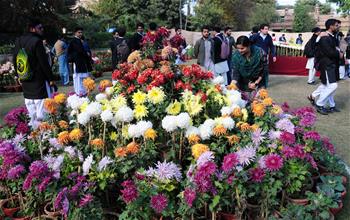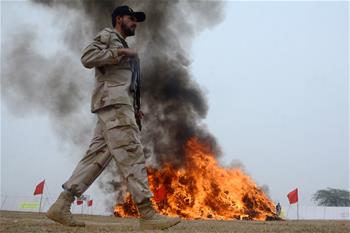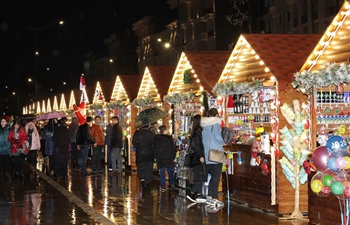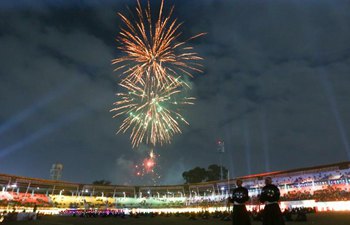By Oliver Trust
BERLIN, Dec. 11 (Xinhua) -- It must be some kind of sixth sense that makes the young men stop in time before the metal fence at the side of the pitch gets in their way.
A thin layer of ice covers the artificial pitch in the upper-class Stuttgart suburb of Killesberg. Floodlights light up the night, at least for those who can see.
Everybody else face the challenge of having to guess the exact position of the gate leading to the training ground of the multiple German blind football champions, MTV Stuttgart.
Amsa is there. A 12-year-old boy, blind from birth. His father takes him to Stuttgart from a town 50 kilometres away. All others are adults; many play for the German national team.
Together with Mulgheta Russom and coach Giuseppe Calaciura, Alexander Fangmann is quickly setting up the youngsters' training plan. From now on, it's up to the 41-year-old and 67-time German international Russom to supervise the session for the club's new arrival.
Young talents are a rare species in blind football, says Fangmann adding the word "fortunately". Medical therapy has developed. Other than regular football, 34-year-old Fangmann and his fellow sportsman can't count on the advantages of a mass sports movement.
Blind footballers either make it to the Bundesliga or have to be satisfied with the training sessions. It takes up to a year to get in shape for the national league, founded in 2008.
Therefore, the established footballers care for new arrivals. And Amsa is having fun; his laughing tells the story as Russom seems to be an excellent entertainer.
Fangmann turned blind at the age of eight. He is one of the first initiators of blind football in Germany. The first team was founded in around the time of the 2006 World Cup. Over 15 training groups all over the country were set up over the years.
Today, Fangmann is a multi-tasking functionary. National team captain, athletes' representative, managing his club, inclusion-manager for the regional association and board member of the Sepp Herberger Foundation, run by the German FA, dealing with various social tasks.
The German Disabled Sports Association and the German Blind and Partially Sighted Association provide additional support to the FA.
It sounds futuristic, the way four outfield players chase the ball containing bells to deliver acoustic signals on the pitch 40mx20m. They wear protective headbands and blindfolds.
Watching training or matches shows how vital teamwork is. The speed is breath-taking; their ball skills make the footballers look like gifted artists.
To protect players from injuries, all participants shout out the Spanish word "Voy," meaning "I am coming" as they go into a tackle. Not to shout is equivalent to a foul. The two goalkeepers are the only sighted performers but aren't allowed to leave the two-meter goal zone. Next to them, guides can see and are situated behind the goals and the half-way line.
Blind football is a bridge to daily life for the disabled as they face similar challenges. It not only delivers confidence but "makes you move smarter, fit and flexible," Fangmann told Xinhua in an interview.
To judge distances, to react quickly to noises makes blind football a high-performance sport and training for daily life. Blind people see with their ears as noises deliver orientation points.
Blind football provides the feeling to be active and part of a team instead of always asking for help.
"I rarely know any blind footballer who is shy and not an open person wanting to go outside. To be blind and do sport makes you communicative," Fangmann said.
Compared to the ordinary pedestrians' speed, blind football competition is a high-speed game in narrow spaces.
Fangmann called it one of the biggest challenges to convince parents of blind children of the value of sport and football. "At first they only see the danger of injuries and only at second "sight" the great advantages."
To get along in daily life contains the necessity to sometimes ask for help. Fangmann calls it a process "to learn to accept your limitation." But sighted people need to learn as well.
"I remember how much I was ashamed of placing the table napkin on my legs in a restaurant until sighted people told me they do the same to protect their pants."
The reward for a long training session out in the cold German winter is waiting inside the MTV club restaurant, run by Paola's parents. Paola is Alexander Fangmann's wife, a pretty and caring young local Swabian woman with Italian roots. She can see.
As much as midfielder Fangmann loves to hear the bells ringing after scoring goals, he loves chocolate gingerbread. "It's alright after training," he said with a smile on his face while Paola was gently stroking his head.

















